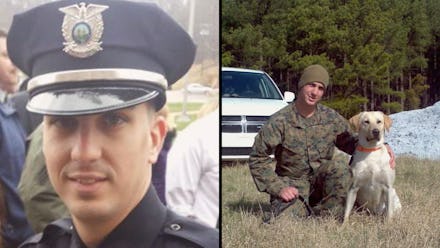This officer was fired after he didn't shoot a black man in distress. Now he's suing.

Stephen Mader, a former police officer in Weirton, West Virginia, sued the city and local police department for firing him after he didn't shoot a black man trying to commit suicide by cop.
In May 2016, Mader encountered Ronald Williams, a distressed African-American man whose girlfriend had called police to their Weirton home after Williams reportedly threatened to harm himself.
Williams was holding an unloaded gun and pleaded with Mader to "just shoot me," according to the former officer's lawsuit.
Mader, a veteran of the War in Afghanistan, said he relied on his training in the military, and attempted to de-escalate the situation and prevent any loss of life. But when two of Mader's fellow officers joined him on the scene, one of them fatally shot Williams in the head.
The use of lethal force rattled the community, in light of the facts that Williams had apparently been experiencing a mental health crisis and that Mader, a white officer, had attempted to save the black man's life. Mader was fired following the incident.
On Feb. 12, 2018, the former Weirton officer and his lawyer announced that a settlement had been reached in the suit. The city of Weirton agreed to pay Mader a sum of $175,000 to dismiss the matter, according to a statement released by the American Civil Liberties Union of West Virginia.
“At the end of the day, I’m happy to put this chapter of my life to bed,” Mader said in the statement. “The events leading to my termination were unjustified and I’m pleased a joint resolution has been met. My hope is that no other person on either end of a police call has to go through this again.”
Mader's lawsuit, filed in a U.S. District Court in West Virginia, alleged that the city violated his rights against unjust termination, his First and Fourteenth Amendment rights under the U.S. Constitution and other rights under the Constitution of the State of West Virginia.
"I lost a job I loved," Mader said in a statement released in May, when the suit was filed. "As a police officer I took an oath to protect and serve my community. I feel like I was fired for trying to uphold that. Even still, I would have done the same thing."
The lawsuit alleged that Mader showed a level of restraint that so many other officers have not shown in encounters with armed and unarmed black citizens.
It also contained an allegation that the Weirton officials only fired Mader after local news outlets caught wind of the story, and to protect Mader's colleague who had used lethal force against Williams. Mader said local officials tarnished his reputation in retaliation for his speaking to a local newspaper about the shooting and his firing.
In an emailed statement to Mic, the city of Weirton said in May that it had not received a copy of the lawsuit and deferred making comment until its legal counsel could review it.
According to a 2016 NPR story on Mader's case, City Manager Travis Blosser said the former officer's failure to shoot wasn't the only reason for his termination. Mader's record of conduct included "illegal searches in a vehicle," "use of profanity with citizens" and "contaminating a crime scene of a potential homicide investigation," Blosser told NPR.
Timothy O'Brien, the attorney defending Mader along with the West Virginia ACLU, said Mader's conduct should have been praised instead of penalized.
"To tell a police officer — when in doubt — either shoot to kill or get fired, is a choice that no police officer should ever have to make and is a message that is wrong and should never be sent," O'Brien said in a statement.
In recent years, uses of lethal force against African-Americans by law enforcement have drawn sustained protests from activists in the Black Lives Matter movement and by other civil rights advocates. One example is the case of Betty Shelby, the Tulsa, Oklahoma, police officer who fatally shot Terence Crutcher in September. She began trial Monday on a manslaughter charge. Crutcher's family has said Terence, whose vehicle had reportedly stalled in the middle of a Tulsa roadway, needed police assistance, instead of a bullet to his chest.
Mader's case and others like it show why law enforcement agencies need new use-of-force training, Joseph Cohen, executive director of the West Virginia ACLU, said in a statement: "The Weirton Police Department, like so many others in West Virginia, needs training to appropriately engage with people, to fight the implicit biases that infect our society, and to make de-escalation a primary goal."
Feb. 20, 2018 9:49 a.m. Eastern: This story has been updated with the announcement of a settlement in the former Weirton officer’s lawsuit.